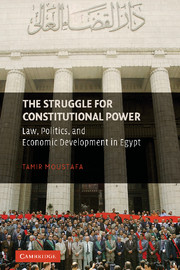Book contents
- Frontmatter
- Contents
- List of Figures and Tables
- Acknowledgments
- 1 Introduction: Law versus the State
- 2 The Politics of Domination: Law and Resistance in Authoritarian States
- 3 The Establishment of the Supreme Constitutional Court
- 4 The Emergence of Constitutional Power (1979–1990)
- 5 The Rapid Expansion of Constitutional Power (1991–1997)
- 6 Executive Retrenchment and an Uncertain Future (1998–2005)
- 7 Law, Development, and Democracy: A Critical Appraisal
- APPENDIX A SCC Justices and Commissioners
- APPENDIX B The Egyptian Constitution
- APPENDIX C Law 48 of 1979 Governing the Operations of the Supreme Constitutional Court of Egypt
- APPENDIX D Figures on Supreme Constitutional Court Rulings
- Bibliography
- Index
7 - Law, Development, and Democracy: A Critical Appraisal
Published online by Cambridge University Press: 27 July 2009
- Frontmatter
- Contents
- List of Figures and Tables
- Acknowledgments
- 1 Introduction: Law versus the State
- 2 The Politics of Domination: Law and Resistance in Authoritarian States
- 3 The Establishment of the Supreme Constitutional Court
- 4 The Emergence of Constitutional Power (1979–1990)
- 5 The Rapid Expansion of Constitutional Power (1991–1997)
- 6 Executive Retrenchment and an Uncertain Future (1998–2005)
- 7 Law, Development, and Democracy: A Critical Appraisal
- APPENDIX A SCC Justices and Commissioners
- APPENDIX B The Egyptian Constitution
- APPENDIX C Law 48 of 1979 Governing the Operations of the Supreme Constitutional Court of Egypt
- APPENDIX D Figures on Supreme Constitutional Court Rulings
- Bibliography
- Index
Summary
Scholars and policymakers have placed a great deal of faith in judicial reform as a cure-all for the political and economic turmoil plaguing developing countries in Latin America, Asia, Africa, and the Middle East. Rule-of-law institutions have been charged with safeguarding human rights, spurring economic development, and even facilitating transitions to democracy. These expectations are grounded in our understanding of the way that legal institutions, markets, and the state developed in the West. Although dependency scholars and others have highlighted the radically different circumstances that “late-late” developing countries face, there is still a pervasive assumption that rule-of-law institutions, market economies, and democracy are self-reinforcing. Indeed, these relationships seem both intuitively sound and historically accurate.
Some of the earliest writings in the social sciences by Adam Smith, Max Weber, David Ricardo, and others examined how independent and effective judicial institutions provided the stable property rights system necessary for long time horizons and vigorous private investment. Similarly, judicial institutions are seen as essential tools for providing the checks and balances necessary to curb arbitrary rule. In this view, arbitrary rule is inimical to democratic governance and viable market economies alike, making legal infrastructure essential not only to enforce the rules of the economic game, but to enforce the rules of the political game as well. Finally, we have long observed that economic growth and market economies are positively correlated with the social requisites for democracy.
- Type
- Chapter
- Information
- The Struggle for Constitutional PowerLaw, Politics, and Economic Development in Egypt, pp. 219 - 238Publisher: Cambridge University PressPrint publication year: 2007



